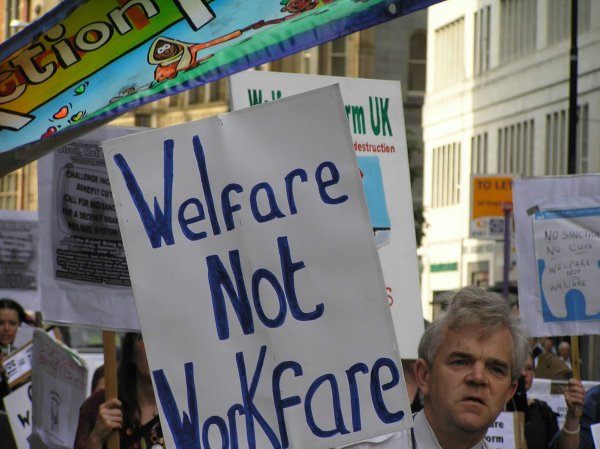UK institutes Work-Fare for able-bodied welfare recipients
Even the British Labour party is likely to agree to this reform, as the UK has one of the highest welfare rates in Europe.
I think they should wake up. Many middle-class workers also have to scramble to take care of sick children, sometimes losing pay for that day. And how can they say that lack of unionization is an excuse to scrap the entire program? How about the workers apply for a union job while on workfare, gaining work experience at public expense. They are more likely to get that job, than a welfare mom walking straight into a union job with no experience whatsoever.
Unemployment has become a huge problem in America with many able-bodied Americans currently out of work due to bad economic conditions. The few jobs available are held for those who have jobs already and are looking to switch. Those out of work often have bad credit and are sometimes in the foreclosure process, which shows up on a credit check, also making it more difficult to be hired by employers who may check credit before hiring. Workfare programs or any type of employment training, assistance and placement is desperately needed.
Those forced to take up Work Activity Placements will be expected to spend 30 hours a week for four weeks at a time in a local business or project benefiting the community.Workfare in America began in the 1990s when President Clinton, under the influence of the Republican congress, instituted workfare reforms that helped get the nation's unemployed back to work. In Portland, Maine, the workers continue to speak well of the program:
If they do not attend or fail to complete the placement a "significant" financial sanction will be imposed, such as withholding Jobseeker's Allowance for at least 3 months, government insiders said.
One source close to the plans said: "We know there are still some jobseekers out there who need an extra push to get them into the mindset of being in the working environment.
"This is all about getting them back into a working routine which in turn makes them a much more appealing prospect for an employer looking to fill a vacancy, and more confident when they enter the workplace.
"The goal is to break the habit of worklessness."
Some five million people are currently claiming out of work benefits in the UK, with 1.4 million claiming for 9 out of the last 10 years.
Britain has one of the highest rates of workless households in Europe, with 1.9 million children living in homes where no one has a job....
Under the plans, claimants face a new 12-month cap on their benefits, if ruled able to work. People who cannot work, for example the terminally ill, would be given support with no time limit.
Each morning, Portland's General Assistance office fills with men and women who need help paying their rent or some other basic expense.Not exactly everyone supports it, of course. The Freedom Socialist Party wrote in 2008 that workfare programs and welfare cuts were:
But they're here for the day's job assignments.
One by one, they are sent off to clean the city's homeless shelter, do laundry at the Barron Center, clean up a park or do clerical work at City Hall, among other things.
These days, for thousands of Mainers, welfare is work. And people on the receiving end say they like it that way.
"I used to say these people are living off the state, and now I'm getting help," said Chris Conley, an unemployed 22-year-old. "That's why I like the work. ... I don't want to feel like it's handed to me."
Helping more Mainers move from welfare to work, by providing job skills, experience or education, is the one reform that virtually everyone supports.
Targeting the poor first. Going after welfare recipients isn't new. In 1996, Bill Clinton boasted that he was going to "end welfare as we know it." He then introduced TANF (temporary assistance for needy families), which put lifetime limits of five years on welfare aid and forced many parents into workfare - jobs that never pay a living wage. Since then, the U.S. government has dramatically reduced those who receive welfare to 1.8 million families, down from about 5 million in 1994....The socialist website went on to complain that the mothers on this program did not have back-up childcare available if their children got sick, and that they were unable to take their own sick days to take care of a sick child. Also, the workfare recipients were unable to unionize themselves on the level of powerful AFSCME unions.
This hardly means that millions have pulled out of poverty. Most families have moved into the ranks of the working poor, no better off than before.
Many have physical or mental health problems, few job skills and little work experience. Indeed, the government reports that 44 percent of TANF recipients have some sort of disability.
Others lack transportation or basic education. And in many locales across the U.S., there simply are no living-wage jobs available.
I think they should wake up. Many middle-class workers also have to scramble to take care of sick children, sometimes losing pay for that day. And how can they say that lack of unionization is an excuse to scrap the entire program? How about the workers apply for a union job while on workfare, gaining work experience at public expense. They are more likely to get that job, than a welfare mom walking straight into a union job with no experience whatsoever.
Unemployment has become a huge problem in America with many able-bodied Americans currently out of work due to bad economic conditions. The few jobs available are held for those who have jobs already and are looking to switch. Those out of work often have bad credit and are sometimes in the foreclosure process, which shows up on a credit check, also making it more difficult to be hired by employers who may check credit before hiring. Workfare programs or any type of employment training, assistance and placement is desperately needed.




Comments
Post a Comment